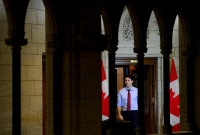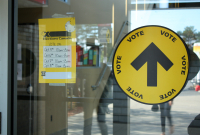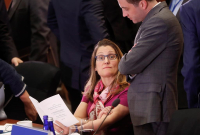Support strong Canadian climate journalism for 2025
A Conservative candidate for a seat in Toronto in this fall's federal election is asking the Federal Court to shift voting day because it falls on a Jewish holiday.
Election day can be no later than Oct. 21 under federal law, but Chani Aryeh-Bain wants the court to force Elections Canada to move the day over the objections of the chief electoral officer.
Voting day is on the Jewish holiday known as Shemini Atzeret, when Orthodox Jews are not permitted to work, vote or campaign. The notice of application filed Thursday argues that Election Canada's refusal to move voting day is unreasonable.
Aryeh-Bain hopes to win back the riding of Eglinton-Lawrence, where the Liberals defeated Tory finance minister Joe Oliver in 2015. Also named in the application is Ira Walfish, a voter in York Centre — another riding the Liberals took four years ago — who records show has been involved in the riding's Conservative association.
B'nai Brith Canada said it is considering intervening in the case, having raised the issue with Elections Canada in April.
The organization argues that three out of four advance voting days — which are held on a Friday, Saturday, Sunday and Monday the week before election day — also fall on dates when observant Jews wouldn't be able to vote.
"There should have been no need for this litigation," Michael Mostyn, the group's CEO, said in a statement.
"The chief electoral officer has the discretion to shift election day to avoid 'a day of cultural or religious significance' ... but he has inexplicably failed to take that entirely logical step."
Under federal law, the chief electoral officer can only make a recommendation to cabinet, rather than having unilateral ability to move the election date.
In a statement, Elections Canada said the chief electoral officer, following much consideration, was not ready to make that recommendation "this close to the start of the election." The statement called the timing of election day and the holiday "unfortunate."
"The chief electoral officer has instructed returning officers in ridings with large Jewish population to reach out to members of the community to better determine what their needs are," spokesman Ghislain Desjardins wrote.
"We are also conducting outreach to targeted national and local media outlets to convey information about voting options among Jewish communities."
Among the changes Elections Canada plans to promote are extended hours — from 9 a.m. to 9 p.m. — at advance polls.
The agency is also implementing a faster model for voting at Elections Canada offices any time from the official start of the campaign until six days before the election, which the agency expects to cut voting time in half. It is expanding special ballot voting services on college and university campuses that Elections Canada hopes will number 115 campuses this year, up from 39 in the 2015 election.
The latest census figures from 2016 show Jews make up a small portion of the two ridings' populations, although the numbers won't be precise until after 2021 when a question about religious affiliation appears on the census questionnaire. The question is asked every 10 years.
But the religious dynamics at play in York Centre, in particular, were previously made apparent by Mark Adler, the riding's former Conservative MP.
In 2014, Adler was caught on microphones begging a Stephen Harper staffer to get in on a photo-op the then prime minister had at the Western Wall in Jerusalem. When he was rebuffed, Adler said, "It’s the re-election. This is the million-dollar shot."
In the 2015 campaign, Adler lost to Liberal Michael Levitt, who is a founding member of the Canadian Jewish Political Affairs Committee, among other parts of his professional past. Levitt currently serves as chairman of the Canada-Israel interparliamentary group.





Comments